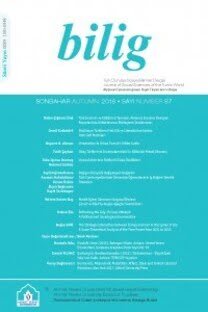Locke on Liberty and Necessity
Locke'ın Özgürlük ve Zorunluluk Anlayışı Üzerine
___
BENNETT, Jonathan (1994), "Locke's Philosophy of Mind," in Vere Chappell (ed.) The Cambridge Companion to Locke, Cambridge: Cambridge University Press.BERLIN, Isaiah (1999), "Two Concepts of Liberty" in George Sher and Baruch A. Brody
(eds.) Social and Political Philosophy, Orlando: Harcourt Brace & Company.
CAMPBELL, C. A. (1967), In Defense of Free Will, London: Allen & Unwin.
CHAPPELL, Vere (1994), "Locke on the Freedom of the Will" in G. A. J. Rogers (ed.)
Locke's Philosophy, Oxford: Clarendon Press.
CLARKE, Randolph (1993), "Towards a Credible Agent-Causal Account of Free Will,"
Nous 27: 191-203; Reprinted in Timothy O' Connor (2000), Persons and Causes: The Metaphysics of Free Will, pp. 201-15, New York: Oxford University Press.
COLMAN, John (1983), John Locke's Moral Philosophy, Edinburgh: Edinburgh University Press.
DENNETT, Daniel C. (1984), Elbow Room, Cambridge, Mass: The MIT Press.
FISHER, John Martin (1994), The Metaphysics of Free Will, Oxford: Blackwell.
FRANKFURT, Harry (1969) "Alternative Possibilities and Moral Responsibility," The Journal of Philosophy, 66: 828-839.
HUME, David (1978), A Treatise of Human Nature, 2nd ed. Oxford: The Clarendon Press.
KANE, Robert (1996), The Significance of Free Will, New York: Oxford University Press.
LEIBNIZ, G. W. (1996), New Essays on Human Understanding. Peter Remnant and
Jonathan Bennett (trans. & eds.), Cambridge: Cambridge University Press.
LOCKE, John (1975), An Essay Concerning Human Understanding, 2nd ed. Peter H.
Nidditch (ed.), Oxford: Oxford University Press.
MABBOTT, J. D. (1973), John Locke, London: Macmillan.
MALCOLM, Norman (1968), "The Conceivability of Mechanism," Philosophical Review
77: 45-72. Reprinted in Gary Watson (ed.), Free will, pp. 127-49, Oxford:Oxford University Press.
O' CONNOR, Timothy (1993), "Indeterminism and Free Agency: Three Recent Views," Philosophy and Phenomenological Research 53: 499-526.
TAYLOR, Charles (1964), The Explaination of Behavior, London: Routledge.
van INWAGEN, Peter (1983), An Essay on Free Will, Oxford: Clarendon Press.
YAFFE, Gideon (2000), Liberty Worth the Name: Locke on Free Agency, Princeton: Princeton University Press.
- ISSN: 1301-0549
- Yayın Aralığı: 4
- Başlangıç: 1996
- Yayıncı: Ahmet Yesevi Üniversitesi Mütevelli Heyet Başkanlığı
Locke on Liberty and Necessity
Etkin Öğrenmede Yeni Arayışlar: İşbirliğine Dayalı Öğrenme ve Buluş Yoluyla Öğrenme
Türkiye'de Sınıf Öğretmeni Yetiştirme Politikaları ve Sorunları
Isparta İl Merkezi'nde Bulunan Türbeler
FİLİZ NURHAN ÖLMEZ, Şirin GÖKMEN
Osmanlıda Toplumsal Dinamizmden Celali İsyanlarına Giden Yol ya da İki Belgeye Tek Yorum
"Sır Derya" Havzasının Türk Tarihindeki Yeri ve Önemi
Dil Ölümü Bağlamında Kayseri'de Yaşayan Uygur Türk Toplumu
